Macroeconomic uncertainty is creating a negative cascading effect on Bitcoin and Ethereum according to on-chain data.
The most recent Kaiko Research report shows an unsurprisingly bearish trend for crypto investors. Among multiple bearish indicators, the weekly trading volume on exchanges for both Ethereum and Bitcoin has reverted to a level 10 months ago, in June 2021.
Likewise, Bitcoin is 39.67% down from its all-time-high price in November, while Ethereum is down by 36.62% from the same month.
Bitcoin Remains Highly Correlated With Equities
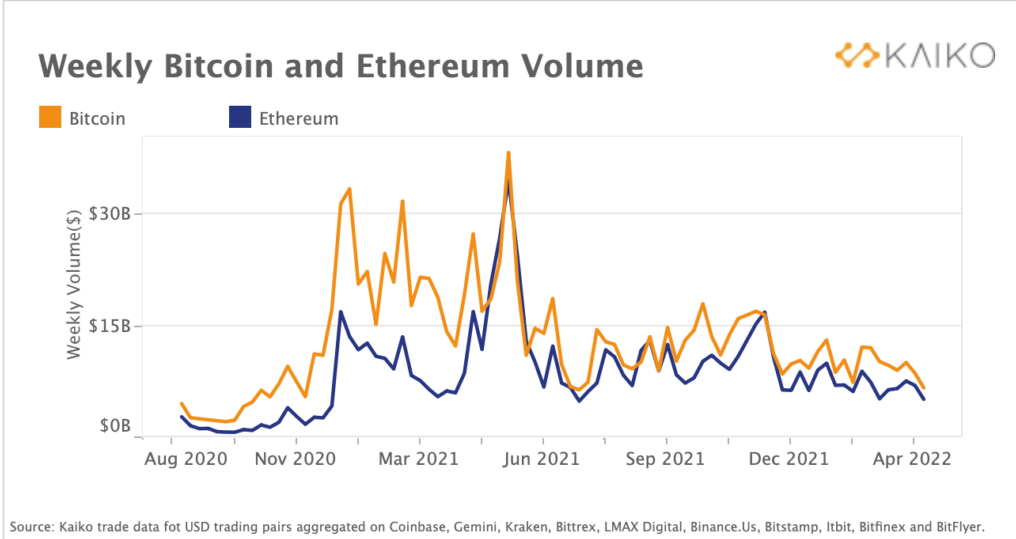
Source: Kaiko.com
Early April saw BTC/ETH weekly volumes go down by 30% compared to the end of March.
Bitcoin is still the largest body in the crypto ecosystem, often pulling up or down other altcoins, with few notable exceptions like Monero (XMR).
By the same token, just as altcoins seem to depend on Bitcoin, so does Bitcoin depend on the equity market. This correlation began to cement in 2020, as more institutional investors poured into the crypto market.
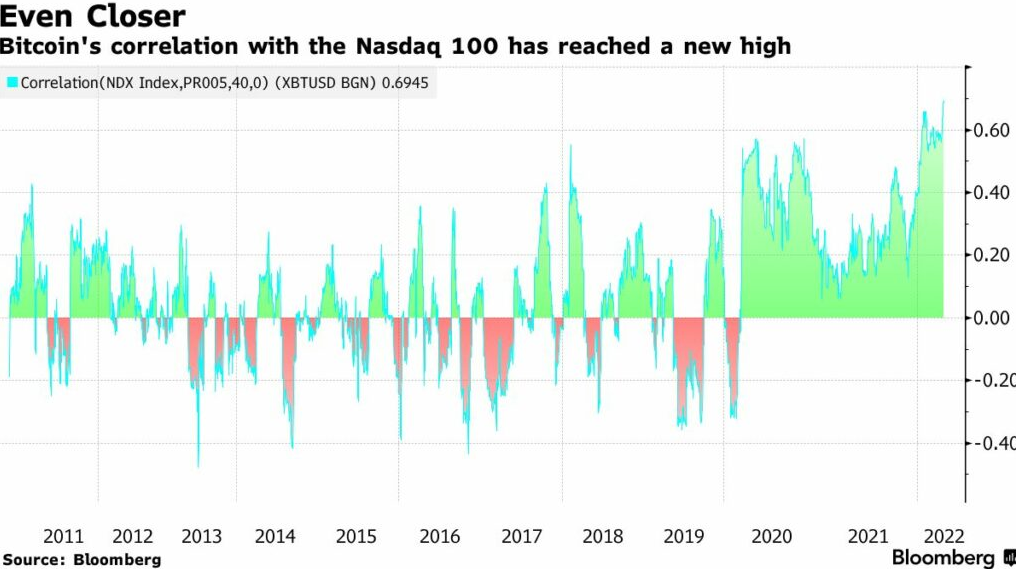
Source: Bloomberg
That period also coincided with near-zero interest rates, providing institutional investors cheap credit. The Federal Reserve had already created an addictive relationship with the equity market since the 2007 – 2009 global financial crisis.
This addiction manifested in 2018 when the Fed announced interest rate hikes to curb its cheap-money policies, resulting in a market tamper tantrum.
However, years of cheap money via quantitative easing (QE), ramped up drastically since mid-2020, eventually triggering spiraling inflation that is now at a 40-year high of 8.5%.
Needless to say, this is highly unpopular as consumer prices make living less comfortable, prompting the Fed to accelerate its next wave of interest rate hikes.
Accordingly, institutional investors who got into crypto are de-risking their portfolios. Inevitably, this creates selling pressure on the dominant cryptocurrency, aligning Bitcoin with tech and risky growth stocks.
It is possible there will be a break-up in the high BTC-equity correlation down the line if long-term Bitcoiners hold the line.
In the meantime, many investors are placing bets on a downturn.
Derivatives Investors Also Bearish
The Kaiko report further notes an intensified put-call ratio not seen in months. The higher it is, the greater the number of bearish bets (puts) compared to bullish bets (calls).
Options volume on the Deribit, the world’s largest BTC/ETH options exchange, pits the put-call ratio against 20-day realized volatility.
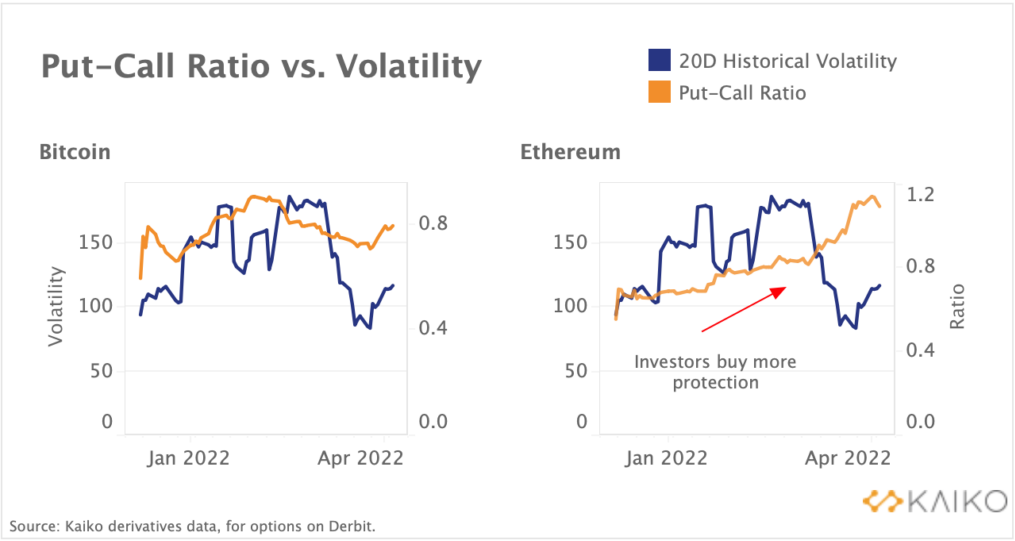
Source: Kaiko.com
As BTC/ETH prices took a tumble last week, investors placed more bearish bets (puts). Interestingly, Ethereum’s puts are higher than Bitcoin’s, despite decreased volatility. Likewise, perpetual futures contracts show the same bearish downtrend.
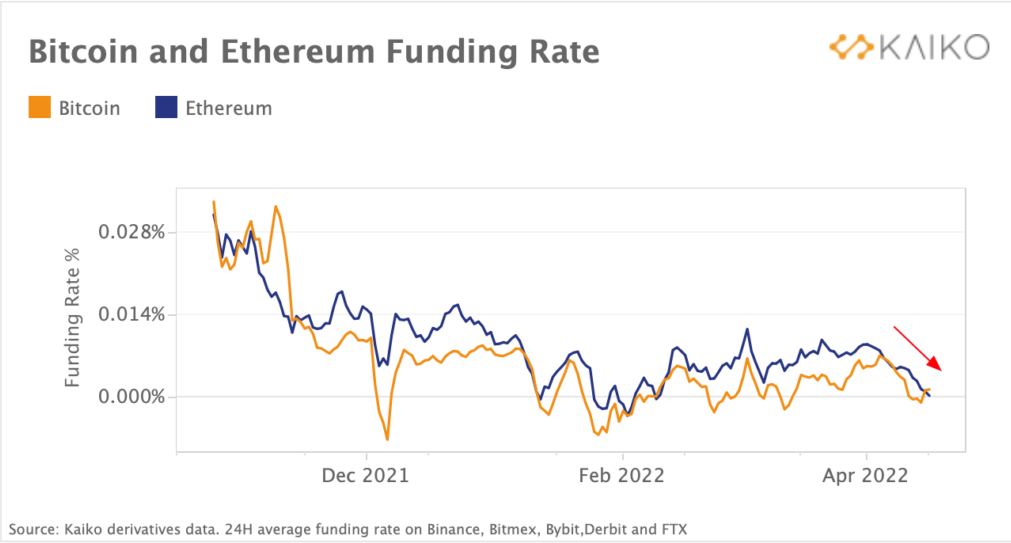
Source: Kaiko.com
Without having a set expiry date, perpetual futures are closer to the underlying asset’s spot price. That’s because their funding rate mechanism stops the perpetuals’ price from veering off from the spot price.
If the funding rate, as a percentage, is in the high positive range, it indicates over-leveraged long positions. Vice-versa, if the funding rate is in the high negative range, it indicates overleveraged short positions, foreshadowing a potential short squeeze.
For instance, if a funding rate of 0.02% on Bitcoin perpetual futures is in a long position with a $10k stake, the account would be deducted $2. For a short position, the account would gain $2, which happens every 8 hours when the funding rate countdown touches zero.
Therefore, if funding rates are positive, it means that long traders fund short traders.
The Dollar Strengthens Amid Devaluation
One would think that the dollar would weaken compared to Bitcoin, given the high inflation rate. However, the Russia-Ukraine conflict dropped a large spanner in the EU’s economic engine, as it is 40% reliant on Russian energy products.
The U.S. Dollar Index (DXY) is a metric against a basket of foreign currencies, with the euro exerting a 57.6% weight. While Russia is firming up its ruble with gold, as the world’s second-largest gold producer annually mining 9.5% of this safe-haven asset, it is also doing so with its massive oil/gas exports.
In contrast, the EU has to seek ways to reroute its entire energy infrastructure, which likely won’t happen before 2027.
Consequently, the Russia-Ukraine conflict boosted the DXY, having gained 4.7% year-to-date (YTD). The Fed’s hawkish U-turn further added to DXY’s rise. In turn, because of its high equity correlation, Bitcoin is inversely correlating with the USD.
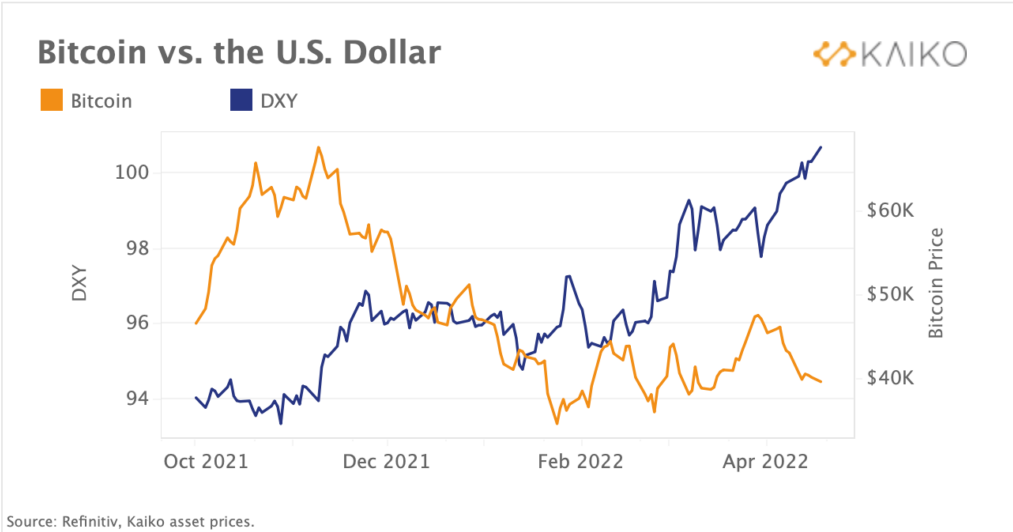
Source: Kaiko.com
This leaves both Bitcoin and Ethereum with negative YTD returns, at -13.35% and -17.94%, respectively. In comparison, it seems that Russia is well-prepared for the conflict, with the ruble outperforming BTC/ETH at -7.65% YTD.
